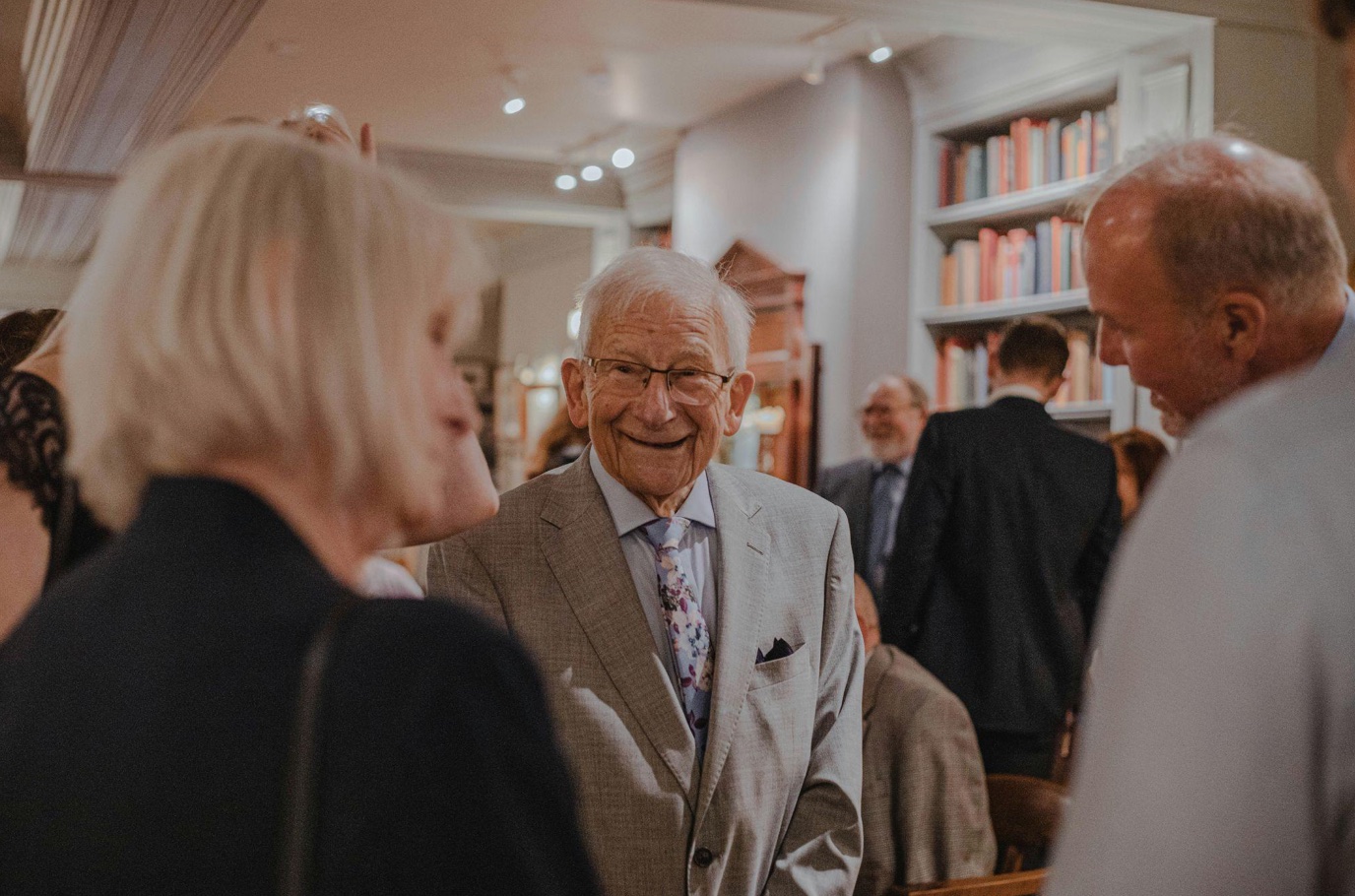To nurture and maintain my current and future connections, I take lawyers out for lunch, join bar events, and consistently reach out to potential referral sources. ~ Ryan Perdue, Partner, Simon Perdue Law
To provide legal professionals with effective networking strategies, we asked attorneys and partners for their best insights. From attending industry conferences and networking events to adopting a give-first networking approach, here are the top eleven strategies shared by these legal experts to enhance your professional growth.
- Attend Industry Conferences and Networking Events
- Collaborate on Projects With Fellow Practitioners
- Focus on Building Meaningful Relationships
- Join the Family Law Bar Association
- Host Quarterly Legal Roundtable Dinners
- Collaborate With Substance-Abuse and Mental-Health Experts
- Engage Meaningfully at Strategic Events
- Attend Industry-Specific Conferences and Seminars
- Foster Relationships for Case-Referral Network
- Utilize Business Cards and Professional Websites
- Adopt a Give-First Networking Approach
Attend Industry Conferences and Networking Events
My firm partners with our local SBA and chamber of commerce to host quarterly education sessions for small-business owners. At our last event, I gave a short presentation on employee handbooks and proper onboarding procedures. Several attendees have since become long-term clients.
Online, I maintain an active profile in several LinkedIn groups for attorneys and small-business owners. Engaging in group discussions and sharing relevant updates has led to new clients and job opportunities. For example, last month a client contacted me after seeing one of my posts in a LinkedIn group. She needed help updating her company’s operating agreement and bylaws.
While in-person networking is still the most valuable for me, using online platforms helps to strengthen connections and increase visibility. Overall, being actively involved in my local business community through events, education, and social media has been key to growing my practice.
Michele Diglio-Benkiran, Attorney, Legal Counsel, PA
Collaborate on Projects With Fellow Practitioners
In my role as a family-law attorney, I prioritize developing authentic and enduring relationships. One specific networking strategy that has significantly contributed to my professional growth is collaborating on projects with fellow family-law practitioners, mediators, and financial advisors. By fostering valuable connections with professionals who share my dedication to assisting families, I enhance my visibility and benefit from their expertise.
Consistently nurturing these relationships through regular follow-ups, mutual referrals, and collaborative events ensures continuous professional support and development. This approach has enabled me to establish a reliable network of trusted colleagues, resulting in increased referrals and a more robust practice.
Mark Childress, Attorney, Law Offices of Mark M. Childress, PLLC
Focus on Building Meaningful Relationships
Networking as a legal professional requires a strategic and genuine approach. I focus on building meaningful relationships rather than simply expanding my contact list. This involves being active in professional organizations, attending industry events, and consistently engaging with peers both online and offline. One key aspect is to always approach networking with a mindset of how I can offer value to others, whether through sharing knowledge, providing introductions, or offering assistance.
A specific networking strategy that has significantly contributed to my professional growth is participating in legal conferences and seminars, particularly those focused on employment law. For instance, I regularly attend the National Employment Lawyers Association (NELA) annual conference. At one such event, I made a concerted effort to attend sessions that were not only relevant to my practice but also those that allowed for interactive discussions and workshops. This approach led to engaging conversations with fellow attendees and speakers.
One memorable instance was a workshop on emerging issues in employment law, where I connected with a fellow attorney who was facing similar challenges in their practice. This connection turned into a collaborative relationship where we exchanged insights and strategies, ultimately leading to a referral partnership that benefited both our firms.
Ed Hones, Attorney At Law, Hones Law Employment Lawyers PLLC
Join the Family Law Bar Association
As a Family Law Barrister, I can tell you that networking is crucial for building a strong practice.
I focus on attending industry conferences and seminars, joining professional associations, and participating in online legal communities. I believe in quality over quantity, so I prioritize meaningful connections over superficial interactions.
One strategy that has been particularly effective is joining the Family Law Bar Association. Participating in their committees and events has allowed me to meet other practitioners, share knowledge, and stay updated on legal developments.
While networking and connecting with people, you should understand that networking is a long-term investment. It’s about building trust and rapport over time. Also, nurturing these relationships through consistent engagement and follow-up is important as well.
Ari Rubin, Family Law Barrister, Nussbaum Law
Host Quarterly Legal Roundtable Dinners
I attended a legal seminar where I met an experienced attorney who shared invaluable insights about personal injury law. We kept in touch, and over time, he became a mentor, guiding me through complex cases and introducing me to influential figures in the legal community.
One specific strategy significantly contributing to my professional growth is hosting quarterly “Legal Roundtable” dinners. I invite a diverse group of legal professionals, from judges to junior attorneys, to discuss current trends and challenges in the field. These intimate gatherings foster deep connections and open doors to collaborative opportunities.

For instance, through one of these dinners, I partnered with a medical expert who now regularly testifies in my high-stakes cases, enhancing my ability to secure favorable client verdicts. This approach builds my network and solidifies my reputation as a dedicated and resourceful attorney.
Ramzy Ladah, Las Vegas Accident Attorney, Ladah Law Firm
Collaborate With Substance-Abuse and Mental-Health Experts
As a criminal-defense attorney, I approach networking by collaborating with professionals like substance-abuse counselors and mental-health experts. I create partnerships and referral networks with these specialists. For example, I connect with local counselors and mental-health professionals to discuss our work intersections and potential ways to collaborate.
I engage with local counselors and mental-health professionals to explore collaborative opportunities and discuss how our work aligns. I offer to facilitate connections with clients who require their services and seek advice on supporting clients in need. Regular communication and check-ins help strengthen relationships and maintain top-of-mind referrals. This strategy expands my network, ensuring comprehensive client support and enhancing both my practice and community connections.
Alex King, Founding Attorney, First Coast Criminal Defense
Engage Meaningfully at Strategic Events
Strategic event and conference participation has been the most effective strategy for my professional growth and for the growth of my law firm.
Attending the right events isn’t just about showing up—it’s about engaging meaningfully and strategically. I make it a point to not only listen to presentations but also to actively participate in panel discussions and Q&A sessions. This approach has allowed me to showcase my expertise, build credibility, and connect with peers and potential clients in a more organic way.
For example, last year I attended the Trial Lawyers Summit in Miami. I made sure to ask some really good questions during the sessions and shared my thoughts during the networking breaks. As a result, I managed to build some really valuable connections that have led to some cool collaborations and client referrals.
A crucial aspect of making valuable connections is avoiding the temptation to hard-sell during these events. One of the biggest mistakes I see lawyers make at networking events is trying to close a deal or land a client on the spot. This approach often backfires, making people uncomfortable and unwilling to forge a relationship with you.
Instead, I advocate for playing the long game. Networking is about building relationships, not making sales. I approach each interaction with the goal of making a genuine connection and providing value, rather than trying to secure immediate business.
This long-term approach has paid dividends. Several of the connections I made at that conference reached out to me months later when they needed legal assistance, citing our initial interaction as the reason they felt comfortable working with me.
Carl Barkemeyer, Senior Criminal Defense Attorney, Barkemeyer Law Firm
Attend Industry-Specific Conferences and Seminars
As a legal professional, I approach networking with the mindset of building genuine relationships and seeking mutually beneficial connections. One specific strategy that has contributed to my professional growth is attending industry-specific conferences and seminars. These events provide valuable opportunities to meet peers, learn about emerging trends, and engage in meaningful discussions.
For example, I participated in a legal-tech conference where I not only gained insights into how technology is transforming the legal landscape but also connected with other professionals who shared similar interests. By actively engaging in discussions, asking questions, and following up with contacts afterward, I was able to establish a network of colleagues and mentors who have since offered support, collaboration opportunities, and referrals. This approach to networking has been instrumental in expanding my professional reach and enhancing my understanding of various legal practices.
Kalim Khan, Co-Founder & Senior Partner, Affinity Law
Foster Relationships for Case-Referral Network
I approach networking by focusing on fostering meaningful and enduring relationships with other attorneys to expand our case-referral network. Back when I was a new lawyer, I picked up a book called “Dig Your Well Before You’re Thirsty,” which highlighted the importance of nurturing business relationships for future use. To nurture and maintain my current and future connections, I take lawyers out for lunch, join bar events, and consistently reach out to potential referral sources. For me, it’s all about ensuring people remember you when they have a case to refer.
Ryan Perdue, Partner, Simon Perdue Law
Utilize Business Cards and Professional Websites
I’m quite traditional when it comes to networking, so I use and prefer business cards. In the legal field, networking often starts with the exchange of a business card. This might seem old-fashioned to some, but it remains a fundamental tool—at least that’s the consensus among many practicing attorneys I’ve spoken to. Despite predictions of their demise, business cards are still very much alive, particularly in law. Personally, if I were in trouble, I’d want to have your business card handy in my wallet or a picture saved on my phone.
Additionally, if you own and run your firm, it’s crucial to have a professionally built and optimized website that complements your business card. Setting up a high-quality website might require some investment and the expertise of a third party, but it’s vital in today’s digital age. A good website allows potential clients to gather information and read reviews, serving as a critical component of modern business practices.
Rosana Tejada Crespo, CEO, Tejada Solicitors Law Firm
Adopt a Give-First Networking Approach
Networking, for me, is centered around meaningful interactions rather than just collecting contacts. It’s about creating opportunities for mutual growth and support, which I have found leads to long-lasting professional relationships.
A strategy that has worked exceptionally well for me is what I refer to as the “give-first” approach. Instead of going into a networking situation with the mindset of what I can gain, I focus on what I can offer. This could be advice, a referral, or even just a listening ear. This approach has helped me build genuine connections, as it shifts the dynamic from transactional to relational.
There’s one event in particular that stands out in my memory. It was a local business community meetup several years back. There, I encountered a small business owner grappling with legal challenges related to her business succession plan. I offered her some preliminary guidance, and we stayed connected. Over time, she transitioned from being a client to referring several other business owners to me. This experience reinforced for me the value of the “give-first” approach and the importance of community engagement in professional growth.
In essence, networking is more than just a professional obligation; it’s an opportunity to learn, grow, and contribute to our community. It’s about building relationships based on trust and mutual respect, which I believe are the cornerstones of any successful legal practice.
Oliver Morrisey, Owner and Director, Empower Wills & Estate Lawyers


Join the conversation!